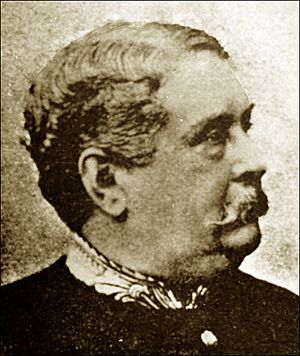Terence O'Brien (colonial administrator) facts for kids
Quick facts for kids
Sir Terence O'Brien
|
|
|---|---|
 |
|
| Acting Governor of British Ceylon | |
| In office 1 December 1863 – 21 March 1865 |
|
| Monarch | Queen Victoria |
| Preceded by | Charles Justin MacCarthy |
| Succeeded by | Hercules Robinson |
| 22nd General Officer Commanding, Ceylon | |
| In office 1860–? |
|
| Preceded by | Henry Frederick Lockyer |
| Succeeded by | Studholme John Hodson |
| Personal details | |
| Born |
John Terence Nicholls O'Brien
23 April 1830 Manchester, Lancashire, England |
| Died | 25 February 1903 (aged 72) London, England |
| Military service | |
| Allegiance | United Kingdom |
| Branch/service | British Army |
| Rank | Major general |
| Commands | General Officer Commanding, Ceylon |
Sir John Terence Nicholls O'Brien (born April 23, 1830 – died February 25, 1903) was an important figure in the British Empire. He was a surveyor, an engineer, and a colonial governor. A colonial governor was a person who managed a colony for a ruling country.
O'Brien was born in Manchester, England. He went to school at Elizabeth College, Guernsey. Later, he studied at the Royal Military College, Sandhurst. This college trains officers for the British Army.
Contents
A Life of Service
Early Military Career
John Terence Nicholls O'Brien joined the British Army. He was a brave officer. He received a special medal for his service. This was during the Indian Mutiny War in 1857. This war was a major uprising against British rule in India.
Governor of Ceylon
In 1863, O'Brien became the acting Governor of British Ceylon. Ceylon is now known as Sri Lanka. He held this important job for two years. He took over from Charles Justin MacCarthy.
Governor of Other Colonies
After his time in Ceylon, O'Brien continued his career. In 1881, he was made governor of Heligoland. This was a small group of islands. He was knighted in 1888, which meant he received the title "Sir."
Leading in Newfoundland
In 1889, Sir Terence O'Brien became the governor of Newfoundland. This is now part of Canada. During his time there, he sent many reports to London. These reports talked about problems with the local government. His reports contributed to a financial crisis. This crisis was known as the 1894 bank crash.
He left his position in 1895. After that, he returned to London.
Legacy and Family
A town in Newfoundland was named after him. It is called Terenceville. Sir Terence O'Brien's son also followed in his footsteps. His son, Sir Charles O'Brien, also became a colonial governor.
Sir Terence O'Brien passed away in London in 1903.
See also
- Governors of Newfoundland
- List of people from Newfoundland and Labrador
 | James Van Der Zee |
 | Alma Thomas |
 | Ellis Wilson |
 | Margaret Taylor-Burroughs |

